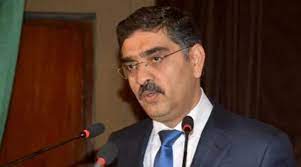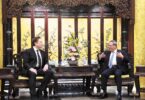The caretaker Prime Minister Anwaar-ul-Haq Kakar has reiterated Pakistan’s commitment to the ECO Vision 2025, calling for collective efforts and accelerated reforms to achieve the Organisation’s objectives and the region’s trade potential for bringing colossal economic and peace dividends.
The Prime Minister urged the bloc nations to make the ECO an effective organisation by implementing their words and commitments into actions, practicable and visible reality. According to him, regional countries must work collectively and diligently to realise the goals and objectives of the Organisation. He noted that the ECO region, if well connected and fully aligned can bring colossal economic and peace dividends for our people.
The 16th Summit of the 10-member Economic Cooperation Organisation (ECO) was held in Tashkent, the capital of Uzbekistan in recent days. The summit was attended by the heads of the states/governments of member nations including Azerbaijan, Uzbekistan, Tajikistan, Iran, Turkey, Pakistan, Kazakhstan, Khyzistan and Turkmenistan. The huddle held an in-depth discussion aimed at promoting bilateral and multilateral ties among the member nations through enhanced connectivity, high-level cooperation and creating ease of doing business and trade for people and businesses in the region.
Meanwhile, regional trade, transport, energy, agriculture, tourism and cultural exchanges have been identified as major avenues for bilateral cooperation and collaboration to realize shared and sustainable progress and development in the region. The two-day session concluded with the repetition of the prospects for the huge untapped potential for regional trade and cooperation, flimsy claims, high hopes and fewer practical steps to realize that daydream and grasp the definite destiny of the people of the region.
Historically, the 10-member bloc of Muslim developing countries comprises over 8 million square kilometres of land, representing 15% of the world population, possesses huge mineral deposits and vast untapped energy reservoirs with a scanty share in global trade, least technological development, and a rare contribution in science and modern innovations. Unfortunately, ECO intra-regional trade stands at less than 8 per cent of the region’s aggregate trade, which is in great stark to other regional blocs such as the European Union, ASEAN and the Asia Pacific Economic Forum that is a matter of concern for the member states, their leadership and bloc Secretariat in Istanbul.
Although, the bloc has specifically set its targets and anticipated goals aimed at boosting intra-regional trade, travel, tourism, and multilateral cooperation but all those endeavours proved futile because of certain administrative, technical and trade issues because all member states are developing agricultural economies, facing problems in bilateral trade except energy and defence sector. The bloc adopted a landmark preferential trade arrangement between the member states and embraced the historic ECO Vision 2025 at the 13th ECO Summit about a decade ago. Unfortunately, all those sane ideas, prophecies and promises are still far from reality and physical existence.
During the past four decades’ journey, the bloc could only achieve limited economic integration, least infrastructural development and insignificant regional connectivity. The inadequate institutional capacity and high tariff barriers among the member states marred the scope for regional economic integration, shared growth and collective prosperity. Meanwhile, domestic political instability in the member nations and the Afghan conflict seriously restricted regional trade and connectivity within the ECO.
In fact, the ECO is a unique mechanism which provides the neighbouring Muslim nations with a sizeable forum for regular interaction, close cooperation, and strengthening of ties in their region. It also continues to hold the promise of a bright future for our succeeding generations with an enormous geo-political significance of their region. The ECO member nations must recognize the importance of their bloc, and the strength of their unity while identifying the causes for their failures to effectively tackle those hurdles to achieve their defined destiny as early as possible.







